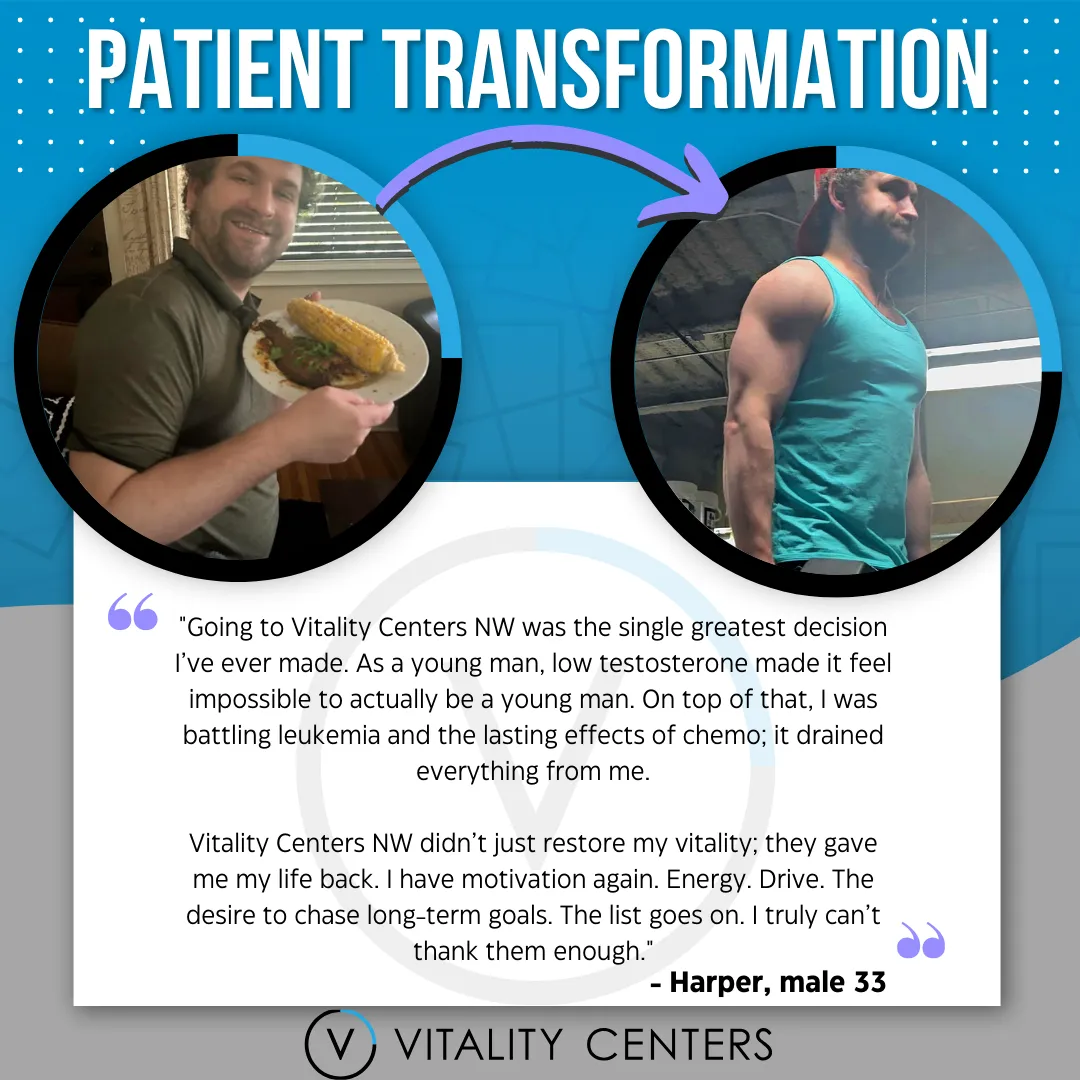Restore Your Energy, Balance Your Hormones, and Reclaim Your Best Self
Vitality Centers offer a full suite of services — including hormone replacement therapy and weight loss treatment — for men and women across Washington, Idaho, Montana, Utah, and Oregon.
Restore Your Energy, Balance Your Hormones, and Reclaim Your Best Self
Vitality Centers offer a full suite of services — including hormone replacement therapy and weight loss treatment — for men and women across Washington, Idaho, Montana, Utah, and Oregon.

HOW WE RESTORE YOUR VITALITY
Simple. Proven. Personalized.
STEP 1: COMPREHENSIVE ANALYSIS
Complete hormone panel for a comprehensive view of your health
One-on-one discussion of your symptoms & aspirations
Together, we determine the best strategy to reach your goals
STEP 2: PERSONALIZED PROTOCOL
One of our experienced providers creates your tailored plan
HRT, TRT, GLP-1, or Peptides based on YOUR needs and goals
Clear timeline & realistic expectations set so you know exactly what to expect
STEP 3: ONGOING OPTIMIZATION
Regular check-ins & lab monitoring to track your progress
Real-time treatment adjustments to ensure your best results
Direct provider access via messaging whenever you need support
Getting started is simple.
Your initial consultation is just $189 and includes a full hour with a provider to review your symptoms, lab work, and goals.
After that, it’s just $99/month, no matter what your treatment plan includes. That monthly fee covers all follow-up visits, provider check-ins, lab orders, and prescription adjustments. Whether you need one medication or several, your monthly cost stays the same.
(Please note: Medication and lab fees are separate.)
Transparent pricing. Ongoing support. Real results.
With your personalized protocol from Vitality Centers Northwest, you'll feel changes in a matter of weeks, and see measurable changes by 30–90 days.
Make the decision to take the first step toward feeling like yourself again.
What does a hormone‑optimizing treatment plan look like?
Click below to explore our menu of services and find the one that matches your goals.
Results That Change Lives.

"Working with Vitality Centers NW has been fantastic. I previously used a similar service that was more than triple the cost and yielded only a fraction of the results. The team at Vitality Centers NW is incredibly professional and quick to respond to emails. I truly believe that they are the best in the business."
My journey began in 2014. I’ve been a Type 1 diabetic for 55 years, and at the time, I was struggling with libido and had completely lost my sex drive which made relationships nearly impossible. I began researching TRT, talking to my doctor, and filtering through a ton of information online. My levels tested around 130–180 ng/dL, and my doctor started me on a very low dose. Eventually, I tried working with a urologist, who agreed to increase my dose and let me switch to subcutaneous injections. I started feeling better, and my libido returned. But when my hematocrit level jumped, he abruptly stopped treatment. I spiraled into depression and was told to wait months before restarting. Desperate for real help, I found Vitality Centers NW in 2019 and I’ve been a patient ever since. From day one, I knew they understood men’s HRT on a different level. Danny Jones, PAC, and the team helped me find the right protocol, and I’ve never felt better. My labs are great, my libido is strong, my personal life is thriving, and even my blood glucose and cardio health have improved. Huge thanks to Danny and the entire team!
"I have been a client of this company for over three years now, and I cannot recommend them highly enough. Their level of professionalism and attention to detail is outstanding. Every interaction I have had with their team has been pleasant and efficient. I am grateful to have found such a reliable and trustworthy company to handle my needs."
"I want to express my sincere gratitude to the team at Vitality Centers NW. When I was referred a little over a year ago, I had just retired from the military and kept hearing my testosterone levels were “normal”, but I didn’t feel normal. I expected more of the same, but your team listened to my goals, dug into my history, and worked with me to find the right path."
"It didn’t take long to get dialed in, and I’ve never felt, looked, or performed better. At 42, with an active lifestyle and a family, I’m in the best shape of my life. Thank you for the guidance and support."
"I have been with Vitality Centers NW for many years now and think the world of their care. They have always gone above and beyond to assist me with any questions I might have. Vitality Center NW in short, saved my life and gave me the care I desperately needed."
"I’m thrilled to share my experience with Vitality Centers NW! I came in feeling drained, navigating a difficult divorce—but thanks to Danny Jones’ expert and compassionate care, I regained my energy and found a more positive outlook. His understanding approach helped me work through sensitive issues with real support and guidance. While I’m still working on improving my sleep and focus, the progress I’ve made has been incredible. I wholeheartedly agree with the glowing reviews online. Thank you! "
"I started with Vitality Centers NW a year ago due to poor sleep, exhaustion, and irritability. Now, my sleep has completely turned around, I’m exercising again, and I’m showing up better for my family, friends, and work. I truly feel like I’m on the road to real health and vitality. "
"Vitality Centers NW has been very helpful in getting my hormones in check, and I feel like a new man. "
"My wife and I can’t thank Danny Jones and the team at Vitality Centers NW enough. After over two years of unsuccessful fertility treatments, we started seeing DJ, and within six months, my wife was pregnant with our first son. Two years later, we welcomed our second. I feel 10 years younger. My libido is up, my strength and energy are back, and my pain has significantly decreased. Truly life-changing"
"Amazing. They are truly amazing. 51 and feel like I am 32."
The Vitality Centers Difference
Unlike online clinics that offer one size fits all protocols with minimal follow-up, our dedicated hormone specialists get to know YOU personally, and through in-depth lab testing, customized treatment plans, and expert adjustments we ensure safe, effective results.

Dan Getz
Doctor Of Osteopathic Medicine
Vitality Centers NW was founded by Dr. Dan Getz, who discovered a passion for the subject and recognized the need for quality testosterone replacement therapy in Washington.
After studying Hormone Replacement Therapy (HRT) through the American Academy of Anti-Aging Medicine, he opened Vitality Center.

Danny Jones
Physician Assistant-Certified
Danny Jones is a 21-year veteran with service in the Navy, Marines, and Army. He received his degree from the University of Washington and still serves in the Army Reserves.
Danny’s motivation for providing male hormone therapy is the gratification of seeing men get back to a happier, healthier lifestyle, and the huge transformation this therapy can have on men’s lives.

Kelly Green
Physician Assistant-Certified
Kelly Green, PA-C, has been practicing since 2016 and joined Vitality Centers to help patients live their best lives. Kelly is committed to providing support and education about weight loss medications and hormone therapies to everyone who is on the path to improving their quality of life.
During her free time, Kelly loves to be out on the water, hiking through the woods or curled up with a good book.

Tae Phillips
Registered Nurse
Tae is a Registered Nurse with a specialty in hormone replacement therapy and a genuine passion for helping people look and feel their absolute best. Her goal is to create a supportive environment for every patient while providing the knowledge and care they need to thrive.
Outside the clinic, Tae enjoys spending time with her family, doting on her dogs, or working up a sweat in Pilates class.
Straightforward Pricing
Our low $99 per month option covers all provider follow-up calls and visits, lab orders, and dosage adjustments. You can connect with a provider as many times as you need over the course of your treatment to ensure you feel supported.
The Vitality Centers Difference
Unlike online clinics that offer one size fits all protocols with minimal follow-up, our dedicated hormone specialists get to know YOU personally, and through in-depth lab testing, customized treatment plans, and expert adjustments we ensure safe, effective results.

Dan Getz
Doctor Of Osteopathic Medicine
Spokane Vitality Center was founded by Dr. Dan Getz, who discovered a passion for the subject and recognized the need for quality testosterone replacement therapy in Washington.
After studying Hormone Replacement Therapy (HRT) through the American Academy of Anti-Aging Medicine, he opened Vitality Center.

Danny Jones
Physician Assistant-Certified
Danny Jones is a 21-year veteran with service in the Navy, Marines, and Army. He received his degree from the University of Washington and still serves in the Army Reserves.
Danny’s motivation for providing male hormone therapy is the gratification of seeing men get back to a happier, healthier lifestyle, and the huge transformation this therapy can have on men’s lives.

Kelly Green
Physician Assistant-Certified
Kelly Green, PA-C, has been practicing since 2016 and joined Vitality Centers to help patients live their best lives. Kelly is committed to providing support and education about weight loss medications and hormone therapies to everyone who is on the path to improving their quality of life.
During her free time, Kelly loves to be out on the water, hiking through the woods or curled up with a good book.

Tae Phillips
Registered Nurse
Tae is a Registered Nurse with a specialty in hormone replacement therapy and a genuine passion for helping people look and feel their absolute best. Her goal is to create a supportive environment for every patient while providing the knowledge and care they need to thrive.
Outside the clinic, Tae enjoys spending time with her family, doting on her dogs, or working up a sweat in Pilates class.
Straightforward Pricing
Our low $99 per month option covers all provider follow-up calls and visits, lab orders, and dosage adjustments. You can connect with a provider as many times as you need over the course of your treatment to ensure you feel supported.
Frequently Asked Questions:
Is this covered by insurance?
While we don't accept insurance directly, we can provide documentation for you to submit to your provider for potential reimbursement with your lab and prescription costs. Many of our patients prefer our direct-pay model as it allows us to provide better, more personalized care without insurance restrictions.
Do you treat both men and women?
Yes, our physician-led team specializes in hormone optimization for both men and women.
Is bioidentical estrogen safer than synthetic hormones?
Yes. Bioidentical estrogen is molecularly identical to what your ovaries naturally produce, unlike synthetic hormones used in older studies. With our comprehensive monitoring, bioidentical hormone therapy is much safer than leaving estrogen deficiency untreated.
Is testosterone replacement therapy safe for men?
Yes, with proper monitoring. We use bioidentical testosterone (identical to what your body produces) with comprehensive lab tracking and real-time adjustments. The health risks of untreated low testosterone are often higher than properly managed TRT.
How does having a board-certified physician on staff benefit me?
Our board-certified physician provides medical oversight, handles complex cases, and ensures all protocols meet the highest medical standards.
How quickly can I get started?
After completing your registration, you'll get instant access to our booking calendar. Most new patients are able to schedule their consultation within 72 hours.
What's included in the $189 consultation?
Comprehensive health history, advanced hormone panels, symptom analysis, and creation of your personalized treatment protocol.
What does the $99/month membership include?
Our model includes direct access to experienced providers, in-depth lab reviews, personalized treatment planning, and ongoing monitoring. Unlike standard clinics with long wait times and limited support, we ensure quick response times, real-time treatment adjustments, and a superior patient experience. You can speak with a provider as many times during the month as you need to ensure all of your questions are answered.
Are lab tests and medications included in my monthly membership?
Lab tests and medications are billed separately. We work with trusted lab partners and pharmacies to ensure you receive high-quality testing and prescriptions at competitive prices.
Is my information secure?
Absolutely. We use bank-level encryption to protect your data, and all consultations are 100% private and confidential. Your privacy is our priority.
Am I getting locked into any contracts or commitments?
Not at all. Your initial consultation is just $189. After that, most patients choose to continue with our $99/month Concierge Program because - let's be real - once you start feeling like yourself again, you're not gonna want to go backwards. We've seen it hundreds of times... patients finally get their energy back, their drive back, their LIFE back... and realize this is how they always wanted to feel. You can cancel anytime, but our longest-term patients are usually the ones getting the best results. Because peak performance isn't about quick fixes, it's about maintaining those optimal hormone levels that keep you feeling amazing.
What happens if I need to adjust my treatment plan?
Your ongoing monthly membership provides for continuous monitoring and direct access to our providers, allowing for real-time adjustments to your treatment plan. Whether you need medication changes, dosage modifications, or additional lab testing, we ensure your care remains personalized and optimized for your health goals.
What if I'm not happy with the results?
We work with you until we find the optimal protocol. With dedicated provider access, we keep adjusting until you get the results you want.

Ready to Reclaim Your Vitality?
Book your free, no-obligation consultation and get a personalized plan within days.
Appointments available in-clinic and via telehealth.

Ready to Reclaim Your Vitality?
Book your free, no-obligation consultation and get a personalized plan within days.
Appointments available in-clinic and via telehealth.
© Copyright 2026. Vitality Centers NW.
All Rights Reserved.











